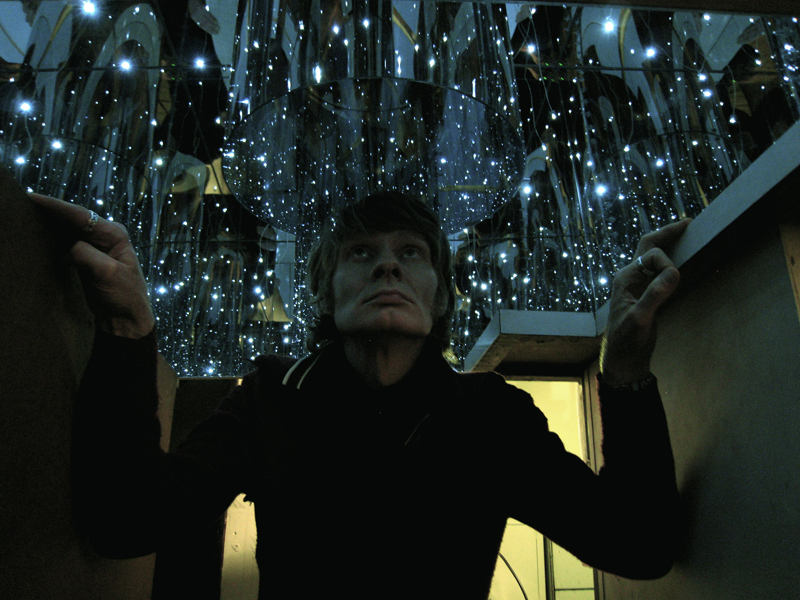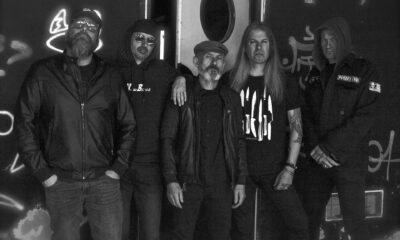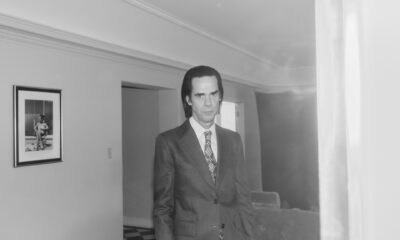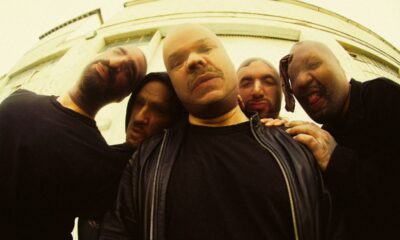Interviews
An Interview with J. G. Thirlwell (FOETUS WISEBLOOD STEROID MAXIMUS)

#TBT – Conducted Circa 2009
By Mike Bax
Photo by Maya Hardinge
It’s utterly surreal to me that Jim G Thirlwell is the kind of musician who is still a relative unknown in the grand scheme of things. The Australian born Thirlwell has been in music for almost thirty years now, and is quite respected amongst his peers. He has recorded under multiple monikers over the years – when I got into his music, most of his albums were recorded as Scraping Foetus Off The Wheel. My mom certainly raised her eyebrows at a few of the LPs when I brought them home from college. For me, the mixture of Thirlwell’s primal vocals intermixed with a heavy drum percussion and some unique synth/guitar orchestrations really captured my imagination. At the time, there really much out there like it that I’d stumbled over. Now, 25 years later, I find I still go back and play some of the early Foetus recordings, and I also continue to follow his career now.
Back in the day, before the internet, I could deduce that Jim was involved with multiple projects by carefully reading the credits and liner notes on the back of albums. The artwork for his projects was often similar, and I’d flip through LP’s at some of Toronto’s finest record stores hoping to find a new LP or EP from Thirlwell on every trip I made to buy new music. If Clint Ruin was involved with a different project – I’d try it. If Frank Want was credited on an LP, I’d try it. It became a sort of game for me, chasing around this person through different projects and partnerships with other musicians. To this day, one of my favourite mid-eighties recordings is the Dirtdish album by Wiseblood (Thirlwell and Roli Mosimann from SWANS), a recording I bought blind because Clint Ruin was credited on the album jacket.
As a musician, Thirlwell cannot easily be categorized. His vocals are somewhat distinct, whether harmonizing the chorus to ‘Someone Drowned In My Pool’ or screeching out the chorus to ‘0-0 Where Evil Dwells’, his singing is always unique and easy to discern. More recently, as he moves into the realm of orchestration/scoring, it’s more of a challenge to pick out his signature sound on some of his music – but his ability to mutate his compositions and engineer something unique and almost disturbing for his audience remains true. In my opinion, he’s still bringing his ‘A-Game’ to the studio on a regular basis, and that’s more than most musicians can boast.
Jim was kind enough to field some questions with me recently. What follows is 20 questions with a musical legend. For the uneducated, you simply MUST swing by http://www.foetus.org/ and learn more about Thirlwell. For the already initiated – some of this information may be old hat, but hopefully there’s a few pearls here for you.
Mike: I find that for the most part, people tend to not know who you are as a musician Jim. Do you find it ironic that you can have so much musical output and remain relatively invisible as a musician?
Jim: Oh yes, terribly ironic.
Mike: Can you talk a little bit about how you started out as a musician (and formed your Self Immolation label)?
Jim: I don’t really consider myself an instrumentalist as such. As a kid I learnt cello and percussion for a while but always had trouble sight-reading music. Later I bought a bass guitar and some synthesizers but I was never one to sit around and become more proficient on my instrument. I was a member of a “band” called Spec Records in 1980 and that experience made me realize I didn’t want to work in a democratic environment.
My first love was the studio and as such I would play all the instruments, but after the overdub I would put the instrument back in the case. After sampling technology and personal computers became affordable, I put my energy into that direction. So I can make a noise on a bunch of instruments, but I consider myself a composer, with my first instrument being the studio. Now I create scores for other people to play, and that’s an exciting “technology” for me.
Mike: In this day and age of self-releasing music, what words of advice might you have, seeing as you have pretty much released everything you’ve done yourself, or in conjunction with a small label.
Jim: Release quality work and self edit heavily. There’s too much out there, it dilutes the culture. Not every squeak needs documentation!
Mike: The aside for self-releasing is Gash which was released in 1995 on Sony/Columbia. How did the major label thing happen? How was the experience? Why just the single Sony release?
Jim: It’s not strictly true that all my releases are self-released. I formed Self Immolation and put out the first six (two albums, three seven inches and a twelve inch) myself , distributed by various independent distributors. Then I signed with Some Bizzare. They released my works until about 1990 though I kept the Self Immolation corporate identity. Various of these releases were released by other labels in different countries, incuding Ze, Homestead, and Thirsty Ear in the US. Then I formed the Ectopic Ents corporation and licensed my releases to various labels, including Big Cat, Thirsty Ear, Nois-O-lution, Cleopatra, Blue Noise, etc. I signed to Sony for two albums, but business affairs saw fit to drop me before the first one was even released, so I was bought out of my contract. In this decade I have self-released some albums distributed solely thru my website, but also licensed albums to Thirsty Ear, Ipecac and Birdman. My next album comes out on the Cartoon Network’s label Williams Street and I will also have an album on John Zorn’s Tzadik label next year, as well as some new material self-released as well. I also sell digital downloads of some of the albums directly from my website .
Mike: You have maintained a history of titling your Foetus albums as four letter, one syllable words, most of which have a double entendre. Was this a conscientious thing that started in 1981 with ‘Deaf’?
Jim: When I named DEAF I wasn’t thinking that – after DEAF I made the conscious decision, hence the follow-up being ACHE. It continued from there and has since become a leitmotif of the Foetus legacy.
Mike: You also have a history of recording under the aliases of Clint Ruin and Frank Want. Was there a reason for the alter egos?
Jim: When I started Foetus I made up a series of aliases to work under to deflect the idea from me being one person. I decided to have a corporate identity and add some mystery as a “band” without photos of the perpetrators. (partly inspired by The Residents). Other aliases included Wade Banks, Bubba Kowalski, Phillip Toss, Aaron Fuchs, and Karl Satan.
Mike: It seems that most of your material since the mid nineties is all released with the Thirlwell name attached and no aliases. Why the change?
Jim: I was over it.
Mike: Can you share how you wound up collaborating with Richard Kern in some of his mid eighties Cinema of Transgression films.
Jim: I met him when he was doing blood performances at The Pyramid Club. He was making Super-8 films and asked if I could help him out with the soundtrack.
Mike: Have you appeared in any other films as an actor or extra?
Jim: Nothing significant.
Mike: With much of your musical output in the past decade being more orchestrated, can you talk a bit about some of the scoring you have been involved with?
Jim: Some pieces had been scored before (eg. the horns for GASH, and the YORK album worked off a score of instructions with kitchen clocks set at midnight)
The first major re-arranging / scoring project was translating the Steroid Maximus album Ectopia, which I proposed to David Sefton at UCLA, and he commissioned it. I worked on the arrangements with Steven Bernstein, who was musical director of the 18-piece band. We premiered it in Los Angeles, and later took it to Le Lieu Unique in Nantes, the Pompidou in Paris, and the Jazz Festival in Tilburg. Later we had an opportunity to expand it by rearranging the LOVE album, for the same instrumentation and performing that at the Donaufestival in Austria.
I have also received commissions to write pieces from Kronos Quartet and Bang On A Can. In 2007 I received a commission from League of Electronic Musical Urban Robots, for their robot instruments. I added a string quartet to their instruments. This has extended into a releationship where I have written further pieces for LEMUR instruments, which premiered at a show at the Whitney.
I’m working on some new pieces for Kronos Quartet which will premiere in March 2010.
Mike: I do not know much about your Manorexia releases. I do own some Steroid Maximus material, and quite enjoy it. It felt to me like you were heading into the domain of more orchestrated music towards the end of the eighties. How does Manorexia differ from Steroid Maximus?
Jim: Manorexia is more spacious, non linear. It’s somehow developed a leaning toward contemporary composition. Steroid Maximus evolved into something more structured. Both are cinematic.
Mike: Sadly, I have never seen you play live. My understanding is that in the eighties, your shows were protested (rumour has it by nuns). Do you still play live shows? Do you tend to play live with the same contributors?
Jim: I stopped playing live in a rock band format in 2001. Since then I did a tour with Baby Zizanie, which was a laptop duo with Jim Coleman. I have performed as an 18-piece band. My latest live project is Manorexia, which is a chamber ensemble – string quartet, piano percusssion and laptop. The membership of all of my ensembles is everchanging.
Mike: I’m of the opinion that your sound helped pioneer what would eventually be termed industrial music (be that right or wrong). I doubt I would have been as open to the sounds of Ministry, Skinny Puppy, and Nine Inch Nails if I hadn’t been a fan of your music already. Did you ever see yourself as a front runner in industrial music? Do you see yourself as a musical peer?
Jim: I hate the term industrial music. It used to have some significance – it was the name of Throbbing Gristle‘s label. Then it encompassed artists using detritus and found percussion like Einsturzende Neubauten, celebrating the “Kollaps”. Later it became anything with a dance beat and a bit of distortion, so the term became meaningless.
I shun categorisation, you can’t sum up what I do in one tidy buzzword. I don’t particularly feel kinship with other acts.
Mike: Using all of your different aliases, fans can backtrack over the past thirty years and find you attached to releases and remixes for the likes of The The, Marc Almond, Jim Coleman, Lydia Lunch, Nick Cave, Nine Inch Nails, Front 242, Red Hot Chili Peppers, Marilyn Manson, and the Kronos Quartet. Are there any I’m missing here? Can you discuss a few of these projects; how they came about? How you felt about the collaborations and end products?
Jim: Yes, many more see the discography http://www.foetus.org. Each one has its own reason to exist and its merits.
Mike: When I look back at how I discovered your music, which was me buying the Calamity Crush / Catastrophe Crunch EP and the Hole LP at a used record store in Toronto, because I thought the cover artwork looked ‘cool’, it makes me wonder if you hear from other fans as to how they got into your music. It’s not like radio has had much of a hand in building your fanbase.
Jim: No, I don’t know about my fans, you’d have to ask them. I guess they all have different stories.
Mike: When you look back at your career in music, is there anything you’d change or approach differently if you had the chance?
Jim: Yes, many things. One is that I would have expanded Butterfly Potion into an album.
Mike: What do you consider to be your most satisfying release Jim? (I find I still play both Hole, Nail and Gash a fair bit. And I was really into the Wiseblood stuff. ‘Stumbo’ has always been an excellent track, and remains a constant on my iTunes ‘frequently played’ list).
Jim: It’s hard to play favorites among my children, but for the Foetus albums I think HOLE and LOVE are strong and consistent. GASH is brutal and exhausting. Also I’m very happy with Ectopia (Steroid Maximus) and Radiolarian Ooze (Manorexia). I don’t often go back and hear my old material, so my favorite work is usually whatever I’m working on at the time.
Mike: Is there a musician or artist you feel particularly drawn to? Someone you’d maybe like to collaborate with?
Jim: It would be nice to do something with David Bowie. I’d love him to sing one of my songs.
Mike: Can you talk a little bit about what you have going on musically right now? Will there be more Thirlwell music in 2009? And from which monikers?
Jim: As for what I’m up to: “The Venture Brothers Volume One : The Music of JG Thirlwell” comes out in April. It’s the soundtrack of the Adult Swim series I have been scoring for the last few years. To be released by Williams Street records. Foetus LIMB is an album of my minimal compositions from 1980 -1983. A double disc digipack set, it will be comprised of the LIMB CD plus a DVD of NY Foetus, a documentary about me by Clement Tuffreau. This features interviews with M.Gira, R,Kern, Lydia Lunch, Matt Johnson, Alex Hacke and more. The DVD will have 40 mins of extras including live material from Steroid Maximus (live at The Pompidou), Manorexia and Foetus as welll as a snippet of my commission for LEMUR. It also comes with a 48 page book of my minimal artwork, all in a deluxe slipcase. It will be released around March and sold exclusively from www.foetus.org. I am also working on some new commissions for Kronos Quartet. I’ve just started work on the fourth season of The Venture Brothers. An album of the chamber versions of my Manorexia compositions will also be released in 2009. And a new Foetus studio album will be released in 2010.
Mike: Lastly, as an artist/musiscian, significantly an artist well learned in doing what you want to do – regardless of commercial success, what’s your take on making music in this current ‘download-all-music-for-free’ climate?
Jim: It’s frustrating as an independent artist that P2P has bred such an atmosphere of entitlement of receiving music for free. The artist’s rights are totally ignored as usual. Music has become devalued, and believe me, just because the means of distribution is free, doesn’t mean music is free. I spend thousands of hours a year making music and I still make albums, not files. I am a record label and I sell my works from my site, both digital and physical. I don’t make much playing live – I don’t play often and have many musicians to pay. I’m not going door to door selling t-shirts. Support the culture or the culture will die!
-

 Music5 days ago
Music5 days agoTake That (w/ Olly Murs) Kick Off Four-Night Leeds Stint with Hit-Laden Spectacular [Photos]
-

 Alternative/Rock6 days ago
Alternative/Rock6 days agoThe V13 Fix #010 w/ High on Fire, NOFX, My Dying Bride and more
-

 Alternative/Rock2 weeks ago
Alternative/Rock2 weeks agoA Rejuvenated Dream State are ‘Still Dreaming’ as They Bounce Into Manchester YES [Photos]
-

 Features5 days ago
Features5 days agoTour Diary: Gen & The Degenerates Party Their Way Across America
-

 Culture1 week ago
Culture1 week agoDan Carter & George Miller Chat Foodinati Live, Heavy Metal Charities and Pre-Gig Meals
-

 Music1 week ago
Music1 week agoReclusive Producer Stumbleine Premieres Beat-Driven New Single “Cinderhaze”
-

 Alternative/Rock1 week ago
Alternative/Rock1 week agoThree Lefts and a Right Premiere Their Guitar-Driven Single “Lovulator”
-

 Alternative/Rock1 week ago
Alternative/Rock1 week agoDeath Wishlist Are Fiery and Fierce with Their “I Get Bored” Video Premiere
















